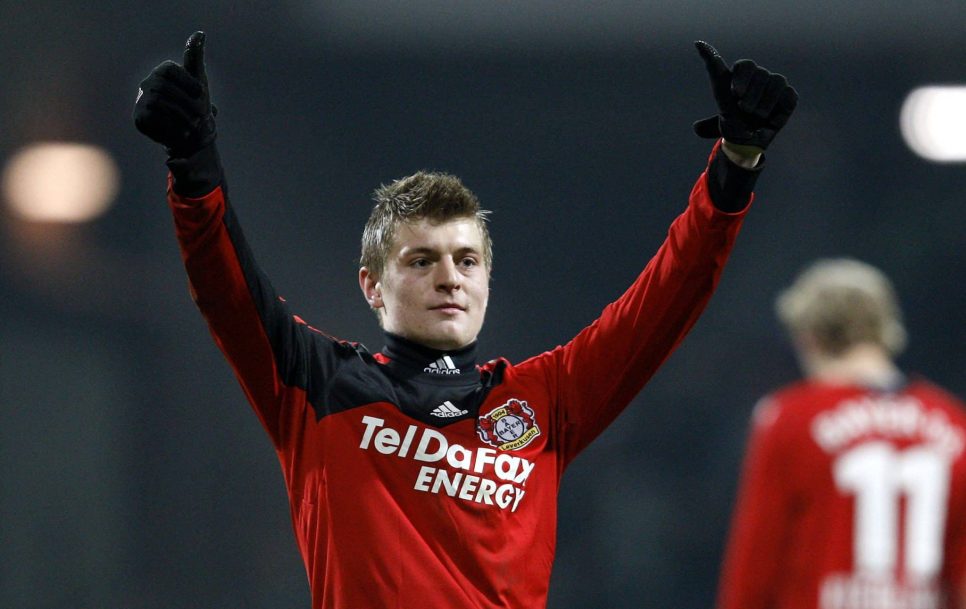1.5 years that transformed Toni Kroos into a footballing beast
Should a young footballer focus on getting as much playing time as possible or train until he’s blue in the face is a question as renowned as “to be or not to be.” Toni Kroos, one of the best midfielders ever, opted for the former option.
The German’s talent was evident from an early age. At 17, he made his debut for Bayern Munich, but despite needing it the most, he did not play much.
On the final day of January 2009, Bayern granted Kroos’s request, and the youngster moved to Bayer Leverkusen on loan. After a year and a half, the midfielder returned to Munich as a significantly improved footballer.
In the end, the tale of Kroos and Leverkusen perfectly illustrates why young players should consider moving to a even slightly lower level if it gives them the opportunity to play extensively.
Words of wisdom
If you believe Chilean legend Arturo Vidal, he was one of those who gave Kroos’s career a push at Leverkusen. “He was good technically, but lacked the touch. Toni came to me and Renato Augusto and we explained to him what football was like. We taught him a lot,” Vidal praised himself and the Brazilian.
Irony aside, Vidal’s words shouldn’t be doubted. Nor should the fact that the help of experienced teammates was an important, but not the most crucial, link in Kroos’s development.
Jupp Heynckes played the most significant role in Kroos’s success at Leverkusen. When the player, considered Germany’s talent of the century, arrived at Leverkusen, the head coach was Bruno Labbadia, who lost the players’ trust and was dismissed in May 2009.
Heynckes, a former star striker and Real Madrid coach, was hired as his successor. “I look at my career in stages,” Kroos has said. “Heynckes was the most important coach I had in the early stage of my career.”
Interestingly, Heynckes, who later worked with Kroos at Bayern, saw the gem of German football as a much more attacking player than we remember him now. He mostly played on the left wing at Leverkusen, not as a box-to-box midfielder. Kroos didn’t care about the position – he liked playing both on the left and in the centre of the field.
While Heynckes was the one who gave Kroos the trust to spread his wings, the German player has a clear view of why he developed so much at Leverkusen. “In my opinion, it’s only logical that in order to develop further, you have to be on the pitch and play as often as possible. That is the absolute basic requirement. If you have a certain level of quality, you can only develop as a young player through match practice. I think that’s normal, and it’s been confirmed for me now.”
Leverkusen did the Neverkusen
During his season and a half at Leverkusen, where he also stood out with excellent set-pieces, Kroos played 48 matches, scored ten goals, and provided 13 assists. Although Heynckes’s protégés won nothing with Kroos, they did set a Bundesliga record.
Besides, every football fan knows the club’s real name was Neverkusen before last season. This referenced to the 2001/02 season when Bayer finished second in the Bundesliga, the German Cup, and the Champions League, even though the domestic league triumph was almost in the bag a few weeks before the season’s end. The curse was only broken last spring when Leverkusen was crowned German champions for the first time.
But let’s return to Kroos and Bayer. The club started the talent’s first and last entire season at Leverkusen incredibly strong. They were unbeaten for the first 24 matches in the Bundesliga, entered the winter break in first place, and the young man on loan from Bayern was their cornerstone. However, the last third of the season went downhill – instead of fighting for the title, Leverkusen finished fourth, missing out on a Champions League spot.
Before returning from the winter break, Bayer’s sporting director Rudi Völler repeatedly expressed his desire to keep Kroos at Leverkusen. The player took the situation with stoic calm: “It’s not about what I want. I have a contract with Bayern, and if they call me back, I’ll go.” And that’s precisely what happened.
Real swooped in
After Kroos returned to Bayern in the summer of 2010, the rest, as they say, is history. He established himself as a key player at Germany’s most famous club, won title after title, and moved to Real four years later.
Interestingly, Kroos was supposed to become a Manchester United player, but coach David Moyes was fired, and his replacement, Louis van Gaal, didn’t want the German in his team. Incidentally, the Dutchman knew Kroos well, having worked with him at Bayern.
Kroos became part of the best era of the Spanish club. He was one of those crucial players who helped the team win three consecutive Champions League titles. Alongside Luka Modrić, they formed a midfield duo that was second to none, and it will likely take us some time to fully appreciate how good Kroos indeed was.







